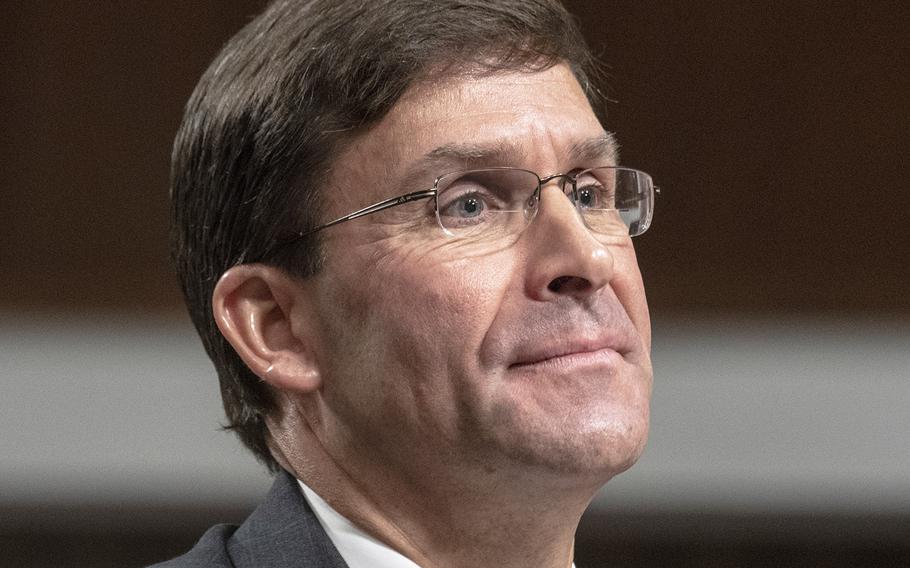
Defense Secretary Mark Esper at his Senate Armed Services Committee confirmation hearing on July 16, 2019. (Joe Gromelski/Stars and Stripes)
WASHINGTON — In Mark Esper’s initial hours as defense secretary, he has created a new task force to probe the use of harmful chemicals in firefighting foam linked to cancers on and near military installations throughout the country.
Esper, who was sworn in Tuesday as the 27th defense secretary hours after he was confirmed by the Senate, told reporters at the Pentagon on Wednesday that he was determined to “get our hands fully around” the problem of contaminated drinking water reported in recent years on or near some 175 military installations. He said creating the task force was one of his priorities during his first day on the job, as are quickly getting up to speed on the latest issues with Iranian aggression in the Persian Gulf region and ensuring U.S. troops remain apolitical in uniform.
Esper took the Pentagon’s reins after the Defense Department spent more than seven months without a confirmed defense secretary. Esper, who was one of three men to serve as acting defense secretary in that time, replaces Jim Mattis, who left the Pentagon on Dec. 31 when he resigned, citing major policy differences with President Donald Trump.
Esper pledged during his confirmation hearing last week before the Senate Armed Services Committee that he would take an “aggressive and holistic” approach to solving the contamination problem. PFAS, also known as perfluoroalkyl and polyfluoroalkyl substances, are man-made chemicals used worldwide since the 1950s in a variety of products, including in the firefighting foam that Defense Department installations have long used, non-stick cookware and water-repellent fabrics. They have been linked to an increase in cancer risks, low birth weights, liver failure and other health problems, according to the federal Agency for Toxic Substances and Disease Registry.
The Environmental Working Group, a nonprofit organization that specializes in environmental research and advocacy, has identified 175 military installations where PFAS has been found in drinking water. The Defense Department has stopped using the foam in training, but it has continued to use it to fight actual fires.
The task force will include experts from the Environmental Protection Agency and the Department of Veterans Affairs, Esper said. The group is to consider all “key issues” of PFAS, including the cleanup of contaminated sites and finding an alternative firefighting solution.
The Defense Department needs to make certain “we go after this problem very aggressively, very holistically and we get in front of it, stay in front of it, take care of our families, our soldiers, sailors, airmen and Marines and the outlying communities,” Esper said. “We need to follow the science on this.”
Esper's first trip as defense secretary will come next week when he visits U.S. Central Command’s headquarters near Tampa, Fla., to focus on major issues throughout the Middle East and south and central Asia, he said. Chiefly that includes updates on recent tensions between the United States and Iran and the military's planning for potential problems there.
The new defense secretary said the U.S. military would protect American-flagged vessels from Iranian aggression in the region, but he stopped short of announcing plans for Navy warships to accompany U.S. commercial ships transiting in or near the Strait of Hormuz, where Iran has attacked and seized commercial vessels in recent months.
“We will escort our ships to the degree the threat requires it,” Esper said. He later added, “escort doesn’t mean [Navy warships] are following right behind — but as long as you are in the area and can react quick enough to deter a provocation, that’s the key.”
Esper also pledged to ensure the U.S. military does not appear to take sides in political issues. The military in recent months has found itself at the center of political controversy following reports that Navy officials were asked by the White House to hide the name of the USS John S. McCain during a Trump visit to Japan. Also during that visit, sailors were photographed wearing unofficial patches on their uniforms depicting a likeness of Trump that included a play on his campaign slogan that read “Make Aircrew Great Again.”
The defense secretary said he would set a “personal example to keep us out of politics as much as possible.”
“It’s something you always have to stay on top of, and that’s my commitment,” Esper said.
dickstein.corey@stripes.com Twitter: @CDicksteinDC